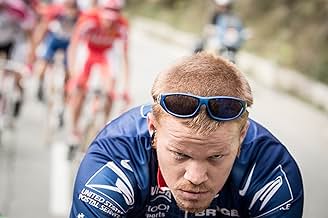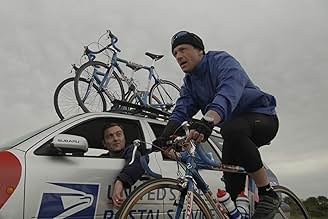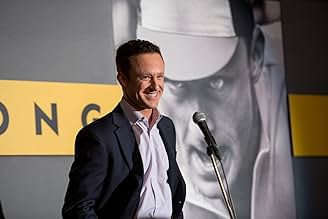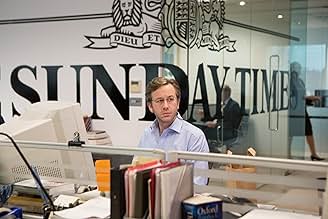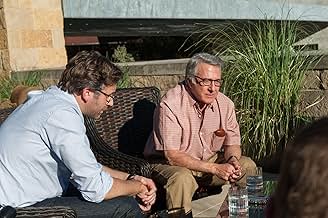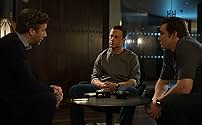AVALIAÇÃO DA IMDb
6,5/10
20 mil
SUA AVALIAÇÃO
Um jornalista esportivo irlandês se convence de que as performances de Lance Armstrong durante as vitórias no Tour de France são alimentadas por substâncias proibidas.Um jornalista esportivo irlandês se convence de que as performances de Lance Armstrong durante as vitórias no Tour de France são alimentadas por substâncias proibidas.Um jornalista esportivo irlandês se convence de que as performances de Lance Armstrong durante as vitórias no Tour de France são alimentadas por substâncias proibidas.
- Direção
- Roteiristas
- Elenco e equipe completos
- Produção, bilheteria e muito mais no IMDbPro
Avaliações em destaque
This is a pretty interesting biopic, with strong performances across the board and a pretty engaging story. However, it's nothing particularly outstanding, due to its evident holding back against really going after Armstrong. Yes, this is still a pretty scathing story, but it still all feels far too plain and simple, and there's never any real gusto in the writing to make you passionately dislike Armstrong, which the movie is trying to do.
But before we get into that, let's look at the most impressive part of this film, which are the performances. Ben Foster, as Lance Armstrong, is brilliant, and often terrifying and hateful to the extent that you really want the movie to show you, and without him doing such a good job in the role, this film would have been at a loss, given his incredible acting.
In the side role as the journalist determined to take Armstrong down, Chris O'Dowd is also pretty good. It's not a world-beating performance that makes you want to whole-heartedly will the man onto revealing Armstrong's lies, but he is a likable character, and one of the only ones that can firmly support in the whole film.
The way that this film tells the history of Armstrong's deception is also very interesting. Although it's all in recent memory for most of us, there's still a lot of information here that you didn't know about, particularly revolving around the inner workings of Armstrong's United States Postal Service team and how he was the ring leader in the world of doping in cycling.
However, that's about it. This film is definitely interesting and well-acted, but it's not an outstanding, memorable biopic. It feels more like reading a very interesting textbook cover-to-cover, full of fascinating information, but with no real high drama or emotion to fully show the significance of what's going on, and to really pull you into the story rather than just observing it.
But before we get into that, let's look at the most impressive part of this film, which are the performances. Ben Foster, as Lance Armstrong, is brilliant, and often terrifying and hateful to the extent that you really want the movie to show you, and without him doing such a good job in the role, this film would have been at a loss, given his incredible acting.
In the side role as the journalist determined to take Armstrong down, Chris O'Dowd is also pretty good. It's not a world-beating performance that makes you want to whole-heartedly will the man onto revealing Armstrong's lies, but he is a likable character, and one of the only ones that can firmly support in the whole film.
The way that this film tells the history of Armstrong's deception is also very interesting. Although it's all in recent memory for most of us, there's still a lot of information here that you didn't know about, particularly revolving around the inner workings of Armstrong's United States Postal Service team and how he was the ring leader in the world of doping in cycling.
However, that's about it. This film is definitely interesting and well-acted, but it's not an outstanding, memorable biopic. It feels more like reading a very interesting textbook cover-to-cover, full of fascinating information, but with no real high drama or emotion to fully show the significance of what's going on, and to really pull you into the story rather than just observing it.
I can see this film dividing opinion, since bike fanatics (of which the UK has a high number) will seek to pick holes in the reality of the story and staging in the same way that a locomotive fan will point out that the 4472, "Flying Scotsman" shouldn't have been in a film set in 1926! I'm not a keen cyclist, (unless you count pottering around the New Forest occasionally as 'cycling'), so I approached Stephen Frears' new biopic on disgraced superstar Lance Armstrong with some reservations. But I really enjoyed it.
Armstrong is portrayed as a massively competitive individual that won't lose at cycling or table football, and won't die (from cancer) either. The film deftly portrays how this drive for success dragged him, like quicksand, into the world of illicit doping. In fact, for much of the film, given that he mixes all of this up with fervent support for cancer charities, I ended up feeling quite sorry for the guy: someone who knows he is cheating and fooling the world but sees it as a viable means to an end. However as his lying, both about the doping and his personal past achievements, becomes more and more cringe-worthy, he becomes a pathetic figure: this is not a great PR exercise for Armstrong.
Above all, the film is a warning shot against having too much belief in overly self-confident people. There are some people who can claim wrong is right and be believed because they state the case with such vehemence and, as portrayed, Armstrong was certainly one of those. In a year of (alleged) similar sporting performances at FIFA, it's a lesson worth learning.
Armstrong is brought brilliantly to life by lookalike Ben Foster, an actor who I must admit to date has rather passed me by. This performance to me deserves a shot at an Oscar nomination. There are parts of the film where he goes all Eddie "Hawking" Redmayne, but aside from these more physical moments, check out the scene where he comes third: just jaw-droppingly effective acting, mixing incredulity and rage all on the same face at the same time. Very impressed.
Foster is backed up by a strong supporting cast: Chris O'Dowd ("Bridesmaids", "Calvary") plays the Irish journalist David Walsh, doggedly pursuing the doping story. It's a believable performance. Jesse Plemons is also great in the complex role of Floyd Landis, a fellow rider on the team who has to struggle with not only lying to the public but (more painfully) to his Pennsylvanian Amish community. Denis Ménochet ("Inglorious Basterds") is also striking as Johan Bruyneel, Armstrong's coach. While getting strong billing, Dustin Hoffman is great, as always, but has little more than a cameo in the film over a couple of scenes. (And talking of random cameos (though I can't see him credited) did I spot Bond producer Michael G Wilson as Armstrong's doctor?).
The sweeping camera shots of cinematographer Danny Cohen ("Les Miserables", "The King's Speech") brings the cycling scenes to life, and are nicely melded with actual footage of the races. (Though some of the Paris green screen award-giving work is rather less convincing).
Director Stephen Frears ("The Queen", "Philomena") directs, and wisely chooses to keep the film to a compact and entertaining 103 minutes.
This has been a good year for biopics, and following the excellent "Love and Mercy" about Brian Wilson, "The Program" makes it onto my list as one of the top 10 of the year so far. Recommended.
(A graphical version of this review is also available at bob-the-movie- man.com).
Armstrong is portrayed as a massively competitive individual that won't lose at cycling or table football, and won't die (from cancer) either. The film deftly portrays how this drive for success dragged him, like quicksand, into the world of illicit doping. In fact, for much of the film, given that he mixes all of this up with fervent support for cancer charities, I ended up feeling quite sorry for the guy: someone who knows he is cheating and fooling the world but sees it as a viable means to an end. However as his lying, both about the doping and his personal past achievements, becomes more and more cringe-worthy, he becomes a pathetic figure: this is not a great PR exercise for Armstrong.
Above all, the film is a warning shot against having too much belief in overly self-confident people. There are some people who can claim wrong is right and be believed because they state the case with such vehemence and, as portrayed, Armstrong was certainly one of those. In a year of (alleged) similar sporting performances at FIFA, it's a lesson worth learning.
Armstrong is brought brilliantly to life by lookalike Ben Foster, an actor who I must admit to date has rather passed me by. This performance to me deserves a shot at an Oscar nomination. There are parts of the film where he goes all Eddie "Hawking" Redmayne, but aside from these more physical moments, check out the scene where he comes third: just jaw-droppingly effective acting, mixing incredulity and rage all on the same face at the same time. Very impressed.
Foster is backed up by a strong supporting cast: Chris O'Dowd ("Bridesmaids", "Calvary") plays the Irish journalist David Walsh, doggedly pursuing the doping story. It's a believable performance. Jesse Plemons is also great in the complex role of Floyd Landis, a fellow rider on the team who has to struggle with not only lying to the public but (more painfully) to his Pennsylvanian Amish community. Denis Ménochet ("Inglorious Basterds") is also striking as Johan Bruyneel, Armstrong's coach. While getting strong billing, Dustin Hoffman is great, as always, but has little more than a cameo in the film over a couple of scenes. (And talking of random cameos (though I can't see him credited) did I spot Bond producer Michael G Wilson as Armstrong's doctor?).
The sweeping camera shots of cinematographer Danny Cohen ("Les Miserables", "The King's Speech") brings the cycling scenes to life, and are nicely melded with actual footage of the races. (Though some of the Paris green screen award-giving work is rather less convincing).
Director Stephen Frears ("The Queen", "Philomena") directs, and wisely chooses to keep the film to a compact and entertaining 103 minutes.
This has been a good year for biopics, and following the excellent "Love and Mercy" about Brian Wilson, "The Program" makes it onto my list as one of the top 10 of the year so far. Recommended.
(A graphical version of this review is also available at bob-the-movie- man.com).
'Champion. Hero. Legend. Cheat.' reads the tagline for The Program, Stephen Frears' film about the controversial and illegal route Lance Armstrong took to winning seven Tour de France titles between 1999-2005. It sure is simple yet delivers a powerful message about one of the once most iconic heroes in sport.
David Walsh (Chris O'Dowd), an Irish journalist for The Sunday Times, first meets Lance Armstrong (Ben Foster) before his Tour de France debut in 1993. Impressed with his enthusiasm yet wary of his chances, Walsh predicts Armstrong will only make a minor impact in the world of cycling.
Fast forward to 1999, Armstrong has beaten testicular cancer and won the first of his seven consecutive Tour de France titles, as well as launching Livestrong, a charity to help those affected by cancer. Walsh, curious of Armstrong's miraculous recovery and performances, begins to doubt the champion and embarks on a journey to uncover the truth in regards to whether Armstrong was using banned substances to enhance his performance.
With the whole world seeming to side with Armstrong, Walsh faces a lonely battle to unearth the truth and bring both justice and respect back to the sport he loves.
What struck me most about The Program was the extent of Armstrong's deception and the program he and his team imposed to both use and hide the use of performance enhancing drugs. Being a true story, I knew that he had confessed to the use of these substances, I just didn't know how he went about it. The Program was a real eye-opener for me, that's for sure.
Frears' film is precise and wastes no time in trying to paint Armstrong in any good light, in fact the film paints Armstrong in the style of Picasso, his character becoming distorted to the point where he becomes almost unrecognisable. There is no time wasting here and with Walsh's brilliantly titled book, Seven Deadly Sins, being the inspiration for the film, Frears has plenty of ammunition to play with.
The performance of Ben Foster as Lance Armstrong has to go down as one of the best of this year. For a long time, Foster has been impressing in supporting roles, even if the films aren't that good however, The Program marks the first time where Foster gets to take centre stage and he well and truly knocks it out of the park as Armstrong, very much portraying him as the villain of the piece.
There is good support from O'Dowd as the persistent Walsh, taking a step away from the comedy roles you would normally associate him with, and Jesse Plemons as Floyd Landis, a member of Armstrong's team who saw both the good and bad in what Armstrong was doing.
The editing by Valerio Bonelli and Danny Cohen's cinematography of the race sequences perfectly capture just how much of an advantage the drugs gave Armstrong and his team, a task made even more achievable with the fact that Foster was taking performance enhancing drugs while shooting the film.
Armstrong may have been shamed and stripped of his seven Tour de France titles but The Program will bring the story to a whole new audience who may know nothing about his deception. Everything he has ever achieved in sports and with his charity is all based on a lie and Frears' film really powers this home.
David Walsh (Chris O'Dowd), an Irish journalist for The Sunday Times, first meets Lance Armstrong (Ben Foster) before his Tour de France debut in 1993. Impressed with his enthusiasm yet wary of his chances, Walsh predicts Armstrong will only make a minor impact in the world of cycling.
Fast forward to 1999, Armstrong has beaten testicular cancer and won the first of his seven consecutive Tour de France titles, as well as launching Livestrong, a charity to help those affected by cancer. Walsh, curious of Armstrong's miraculous recovery and performances, begins to doubt the champion and embarks on a journey to uncover the truth in regards to whether Armstrong was using banned substances to enhance his performance.
With the whole world seeming to side with Armstrong, Walsh faces a lonely battle to unearth the truth and bring both justice and respect back to the sport he loves.
What struck me most about The Program was the extent of Armstrong's deception and the program he and his team imposed to both use and hide the use of performance enhancing drugs. Being a true story, I knew that he had confessed to the use of these substances, I just didn't know how he went about it. The Program was a real eye-opener for me, that's for sure.
Frears' film is precise and wastes no time in trying to paint Armstrong in any good light, in fact the film paints Armstrong in the style of Picasso, his character becoming distorted to the point where he becomes almost unrecognisable. There is no time wasting here and with Walsh's brilliantly titled book, Seven Deadly Sins, being the inspiration for the film, Frears has plenty of ammunition to play with.
The performance of Ben Foster as Lance Armstrong has to go down as one of the best of this year. For a long time, Foster has been impressing in supporting roles, even if the films aren't that good however, The Program marks the first time where Foster gets to take centre stage and he well and truly knocks it out of the park as Armstrong, very much portraying him as the villain of the piece.
There is good support from O'Dowd as the persistent Walsh, taking a step away from the comedy roles you would normally associate him with, and Jesse Plemons as Floyd Landis, a member of Armstrong's team who saw both the good and bad in what Armstrong was doing.
The editing by Valerio Bonelli and Danny Cohen's cinematography of the race sequences perfectly capture just how much of an advantage the drugs gave Armstrong and his team, a task made even more achievable with the fact that Foster was taking performance enhancing drugs while shooting the film.
Armstrong may have been shamed and stripped of his seven Tour de France titles but The Program will bring the story to a whole new audience who may know nothing about his deception. Everything he has ever achieved in sports and with his charity is all based on a lie and Frears' film really powers this home.
We pretty much know the story of the biggest con in sports history.
A 7-time Tour De France winner after recovering from quite severe level of testicular cancer, to be then stripped of everything he had ever achieved in the sport of cycling due to the use of performance- enhancing drugs.
With all that being said, what could this movie do to give us something different to be excited about?
We have director Stephen Frears (Philomena, Dirty Pretty Things, The Queen) exploring the biggest rise and fall probably by anyone in the history of the world.
I'm afraid that despite the solid pace to it, good performances and pleasing visuals, this only really skimmed the surface of the entire story.
Ben Foster plays Armstrong and it is quite un-nerving how much his likeness is uncanny to the man himself. He was a strong lead and definitely made this film watchable and interesting. Chris O'Dowd as hounding sports journalist David Walsh was solid. But I felt he was massively under-used. I think the makers of the film could have better by going down the route 'Rush' did by having two big characters facing-off throughout the feature. All the performances were fine and noticeable in terms of down- grading the film. The only stand-out worth mentioning was Jesse Plemon's portrayal of Armstrong's main team- mate Floyd Landis. He had moments that got me engaged and made it interesting viewing. One casting choice that I was confused about, was the addition of Dustin Hoffman as we see very little of him. Someone that big in the film industry should not be part of a film if he is going to be in there for very short amounts.
The race scenes look well made. Cinematography is a big high point in the film, especially in the opening scene. And finally, the soundtrack fits in the well with the story despite not being quite a captivating one for re-listening.
However, I cannot ignore the safe route this film went. It always went over the important issues quite casually and quickly went on the next one. It seems Frears wanted to throw too much into film and forgot to focus on keeping one angle to the story. I really felt we should have seen more of the journalist pursuing the star type of film which would have made it a great and enjoyable watch.
Connecting to the film was hard as well. It reminded me of The Wolf Of Wall Street as we are trying to connect with a guy we know has bone really bad things. But unlike the Martin Scorsese flick, the style of film-making is nothing remarkable, just passable.
It is still a well-acted drama flick. For those people that don't know a lot about the story, they will get the most enjoyment out of it. But if you want to a good film about Lance Armstrong and how he became the man he is today, watch the two film documentaries 'The Armstrong Lie' and 'Stop At Nothing: The Lance Armstrong Story'. They both go into much more detail on how big of an idiot Armstrong is.
A 7-time Tour De France winner after recovering from quite severe level of testicular cancer, to be then stripped of everything he had ever achieved in the sport of cycling due to the use of performance- enhancing drugs.
With all that being said, what could this movie do to give us something different to be excited about?
We have director Stephen Frears (Philomena, Dirty Pretty Things, The Queen) exploring the biggest rise and fall probably by anyone in the history of the world.
I'm afraid that despite the solid pace to it, good performances and pleasing visuals, this only really skimmed the surface of the entire story.
Ben Foster plays Armstrong and it is quite un-nerving how much his likeness is uncanny to the man himself. He was a strong lead and definitely made this film watchable and interesting. Chris O'Dowd as hounding sports journalist David Walsh was solid. But I felt he was massively under-used. I think the makers of the film could have better by going down the route 'Rush' did by having two big characters facing-off throughout the feature. All the performances were fine and noticeable in terms of down- grading the film. The only stand-out worth mentioning was Jesse Plemon's portrayal of Armstrong's main team- mate Floyd Landis. He had moments that got me engaged and made it interesting viewing. One casting choice that I was confused about, was the addition of Dustin Hoffman as we see very little of him. Someone that big in the film industry should not be part of a film if he is going to be in there for very short amounts.
The race scenes look well made. Cinematography is a big high point in the film, especially in the opening scene. And finally, the soundtrack fits in the well with the story despite not being quite a captivating one for re-listening.
However, I cannot ignore the safe route this film went. It always went over the important issues quite casually and quickly went on the next one. It seems Frears wanted to throw too much into film and forgot to focus on keeping one angle to the story. I really felt we should have seen more of the journalist pursuing the star type of film which would have made it a great and enjoyable watch.
Connecting to the film was hard as well. It reminded me of The Wolf Of Wall Street as we are trying to connect with a guy we know has bone really bad things. But unlike the Martin Scorsese flick, the style of film-making is nothing remarkable, just passable.
It is still a well-acted drama flick. For those people that don't know a lot about the story, they will get the most enjoyment out of it. But if you want to a good film about Lance Armstrong and how he became the man he is today, watch the two film documentaries 'The Armstrong Lie' and 'Stop At Nothing: The Lance Armstrong Story'. They both go into much more detail on how big of an idiot Armstrong is.
On paper, the life of Lance Armstrong lends itself to a cinematic interpretation quite nicely, but The Program, Stephen Frears' restless, showy Armstrong biopic, feels undercooked and premature. Though Ben Foster's Armstrong jokes about Hollywood's plan for a movie about his life (complete with smirky mispronunciations of Jake Gyllenhaal), his against-the-odds underdog tale was never going to be the more compelling film compared to the true story. It's a small mystery as to why Frears decides to play the first half hour of The Program in such a headspace, urging us to cheer for an idealized version of the famed cyclist despite the inevitable mess that awaits us just around the corner. Such an unnecessary sprawl as we turn through a run-of-the-mill rise-through-the-ranks before the downfall is unkind to detail; instead, it feels like a compromise to make the whole thing go down easier for those unaware of the controversy, and thus the film is probably not quite as invested in the scandals in the first place.
Though The Program is clumsy in its execution and handling of loaded material, it nails its depiction of key moral dilemmas surrounding not just Armstrong's doping scandal that eventually stripped him of his professional accolades–including his seven Tour de France titles– but also effectively ended his athletic career with a worldwide ban from most competitive sports. If Chris O'Dowd's journalist, David Walsh, takes down Lance Armstrong, which he spends the majority of the film trying to do, he's taking down not only massive and respectable cancer charities associated with Armstrong, but also the integrity of the sport itself. The film acknowledges that most cyclists were doping at the time, but it tries to shave down its theme to that point while ignoring juicier social commentary regarding our misguided hero worship culture and how we react to the controversies. There's a lot of meat to chew on that remains untouched on the plate, but perhaps Frears already felt his hands full up with a narrative that's far more focused on the interplay between Armstrong and the man determined to expose his skeletons.
As Armstrong, Foster has the drive, the resemblance, and he can balance light and dark in a way that fits the conflicted tone of the man in reality and the fictionalized version of him. It's a shame, for the most part, that Foster tries too hard for too little payoff, almost desperately searching for Oscar clips, but it's John Hodge's screenplay that ultimately lets him down hard, indulging in trite lines that stick out. In a sense, it fits the Armstrong mantra to be over- rehearsed and only approaching an aura of naturalness, though it doesn't work for Foster. His performance here is similar to Anne Hathaway's in Les Miserables, but he's rarely offered the emotional potency to justify his tone. It's still good work, he's just operating on a different gear to everyone else when he should be leading the pack. While the tone of the film feels like easy resort, at the very least it does a good job of showing the gravity of Armstrong's actions and the gravity of Walsh's accusations.
While Foster may falter, The Program boasts a strong ensemble overall, which also includes Dustin Hoffman, Lee Pace, and Jesse Plemons. O'Dowd made his name in the tongue-in-cheek TV riot The IT Crowd, but he's hard to take seriously in dramas or comedies in both America or Britain. He consistently feels like a novelty more than a talent. Here, he's toe-to-toe with Foster and showing his dramatic potential. While he has one note to play (determined exasperation), he plays it well and pleasantly engages us. Plemons has another underused snitch role to play (to reference his brief turn in Black Mass this year) and brings that same quiet menace that made his Todd on Breaking Bad so magnetic. It's also nice to see Denis Menochet, most memorable in the opening of Inglourious Basterds, to have a meatier role spread across an entire film here as Armstrong's trainer.
Despite its shortcomings, The Program is still largely entertaining, if not enthralling, which it earnestly tries to be. The whiplash editing of its various race sequences would have worked had the film itself been gunning for a darker subtext, but they're left to hang on the screen and thrill in the moment. The film's lowest point, however, is its on-the-nose rota of soundtrack choices. It feels too needy, whereas the rest of the film can get away with what it's doing. Unfortunately, the film's narrative ends far too early. Anyone who has seen Alex Gibney's excellent The Armstrong Lie knows that there's an extra side to the story, and a compelling third act that The Program isn't interested in digging through. In fairness, it's not trying to be "that movie," but what it does dramatize is mostly good enough.
7/10
Read more @ Serving Cinema (http://www.servingcinema.com/)
Though The Program is clumsy in its execution and handling of loaded material, it nails its depiction of key moral dilemmas surrounding not just Armstrong's doping scandal that eventually stripped him of his professional accolades–including his seven Tour de France titles– but also effectively ended his athletic career with a worldwide ban from most competitive sports. If Chris O'Dowd's journalist, David Walsh, takes down Lance Armstrong, which he spends the majority of the film trying to do, he's taking down not only massive and respectable cancer charities associated with Armstrong, but also the integrity of the sport itself. The film acknowledges that most cyclists were doping at the time, but it tries to shave down its theme to that point while ignoring juicier social commentary regarding our misguided hero worship culture and how we react to the controversies. There's a lot of meat to chew on that remains untouched on the plate, but perhaps Frears already felt his hands full up with a narrative that's far more focused on the interplay between Armstrong and the man determined to expose his skeletons.
As Armstrong, Foster has the drive, the resemblance, and he can balance light and dark in a way that fits the conflicted tone of the man in reality and the fictionalized version of him. It's a shame, for the most part, that Foster tries too hard for too little payoff, almost desperately searching for Oscar clips, but it's John Hodge's screenplay that ultimately lets him down hard, indulging in trite lines that stick out. In a sense, it fits the Armstrong mantra to be over- rehearsed and only approaching an aura of naturalness, though it doesn't work for Foster. His performance here is similar to Anne Hathaway's in Les Miserables, but he's rarely offered the emotional potency to justify his tone. It's still good work, he's just operating on a different gear to everyone else when he should be leading the pack. While the tone of the film feels like easy resort, at the very least it does a good job of showing the gravity of Armstrong's actions and the gravity of Walsh's accusations.
While Foster may falter, The Program boasts a strong ensemble overall, which also includes Dustin Hoffman, Lee Pace, and Jesse Plemons. O'Dowd made his name in the tongue-in-cheek TV riot The IT Crowd, but he's hard to take seriously in dramas or comedies in both America or Britain. He consistently feels like a novelty more than a talent. Here, he's toe-to-toe with Foster and showing his dramatic potential. While he has one note to play (determined exasperation), he plays it well and pleasantly engages us. Plemons has another underused snitch role to play (to reference his brief turn in Black Mass this year) and brings that same quiet menace that made his Todd on Breaking Bad so magnetic. It's also nice to see Denis Menochet, most memorable in the opening of Inglourious Basterds, to have a meatier role spread across an entire film here as Armstrong's trainer.
Despite its shortcomings, The Program is still largely entertaining, if not enthralling, which it earnestly tries to be. The whiplash editing of its various race sequences would have worked had the film itself been gunning for a darker subtext, but they're left to hang on the screen and thrill in the moment. The film's lowest point, however, is its on-the-nose rota of soundtrack choices. It feels too needy, whereas the rest of the film can get away with what it's doing. Unfortunately, the film's narrative ends far too early. Anyone who has seen Alex Gibney's excellent The Armstrong Lie knows that there's an extra side to the story, and a compelling third act that The Program isn't interested in digging through. In fairness, it's not trying to be "that movie," but what it does dramatize is mostly good enough.
7/10
Read more @ Serving Cinema (http://www.servingcinema.com/)
Você sabia?
- CuriosidadesIn an interview with The Guardian, Ben Foster admitted to taking performance-enhancing drugs under medical supervision to prepare for the role.
- Erros de gravaçãoA number of The Sunday Times newspaper front pages on display around the office were published after the time the scenes are set. Most notably, the front cover depicting English Rugby player Johnny Wilkinson winning the 2003 World cup in a scene set in 2001.
- Citações
[repeated line]
Lance Armstrong: I have never tested positive for performance enhancing drugs.
- Trilhas sonorasBlitzkrieg Bop
Written by Joey Ramone, Dee Dee Ramone (as Dede Ramone), Johnny Ramone, Tommy Ramone
Performed by Ramones
Courtesy of Warner Music UK Ltd
Principais escolhas
Faça login para avaliar e ver a lista de recomendações personalizadas
- How long is The Program?Fornecido pela Alexa
Detalhes
Bilheteria
- Faturamento bruto nos EUA e Canadá
- US$ 13.074
- Fim de semana de estreia nos EUA e Canadá
- US$ 5.763
- 20 de mar. de 2016
- Faturamento bruto mundial
- US$ 3.335.613
- Tempo de duração
- 1 h 44 min(104 min)
- Cor
- Proporção
- 2.35 : 1
Contribua para esta página
Sugerir uma alteração ou adicionar conteúdo ausente







